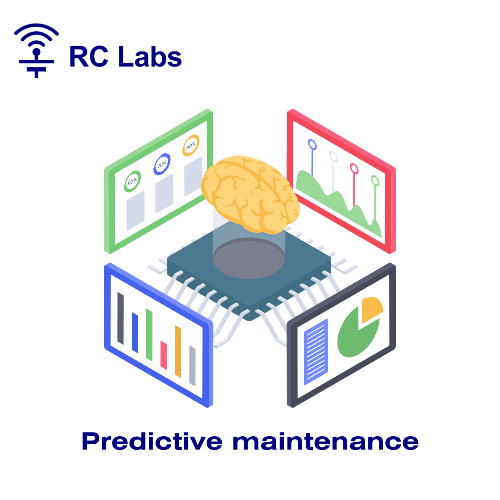Need for predictive maintenance in batteries
Predictive maintenance is a proactive maintenance strategy that harnesses data analytics, and machine learning to predict when an equipment or a machinery is likely to fail. Through the analysis of historical and real-time data, predictive maintenance algorithms have the capability to forecast potential issues, enabling timely interventions before failures transpire. This method differs from the conventional reactive or scheduled maintenance methods, which tend to be less effective and comparatively costlier. The importance of predictive maintenance lies in its ability to revolutionize asset management across various industries. Here’s why it matters:
Cost savings: Batteries carry a significant cost, and the premature failure of batteries can result in substantial financial setbacks. Through predictive maintenance techniques like proactive battery health monitoring and issue detection, one can optimize maintenance planning, prevent unforeseen failures, and reduce downtime. By implementing predictive maintenance techniques, such as monitoring battery health and detecting potential issues in advance, one can plan and schedule maintenance activities more effectively, avoiding unexpected failures and minimizing downtime. In the evolving landscape of the Energy Storage System (ESS) market, projected to reach a substantial market size of 11.76 billion USD by 2030, driven by government mandates for sustainable practices, the shift from diesel gensets to stationary energy storage is imminent. While this transition aligns with the overarching goal of environmental safety, it presents a noteworthy challenge: the initial investment is nearly three times that of diesel gensets. This financial disparity could further amplify if adequate measures are not implemented to ensure the longevity of batteries, subsequently necessitating more frequent battery replacements. Consequently, the implementation of predictive maintenance strategies emerges as a critical factor in mitigating these potential cost escalations.
Enhanced Reliability and Safety: Batteries are crucial across applications like renewable energy and electric vehicles. Predictive maintenance ensures reliability and safety by monitoring battery parameters for anomalies and potential faults, safeguarding system integrity. Batteries serve as the backbone of various applications, from renewable energy systems to electric vehicles. Predictive maintenance merges the concepts of enhanced reliability and safety. By continuously monitoring battery parameters, it detects anomalies and potential faults before they jeopardize system integrity. RC Labs’ adaptive control goes a step further. This proprietary feature employs predictive modeling to understand battery behavior. By doing so, it offers real-time alerts and dynamically adjusts battery parameters, mitigating risks and ensuring a safe and smooth operation.
Optimal battery utilization: Predictive maintenance techniques help optimize battery usage by providing insights into the remaining useful life and capacity of batteries. By monitoring key parameters like state of charge, temperature, and voltage, you can make informed decisions about battery cycling, charging, and discharging, maximizing their lifespan and performance. Integrating batteries into the circular economy represents a crucial aspect. Effectively facilitating their transition to a second life application can significantly curtail the necessity for new battery production, thereby leading to a reduction in overall pollution.
Efficient resource allocation: With predictive maintenance, you can plan maintenance activities based on the actual condition of batteries, rather than relying on fixed schedules or reactive repairs. This approach optimizes resource allocation, ensuring that maintenance efforts are focused where they are most needed, thus reducing unnecessary inspections and maintenance costs. For example: In the realm of fleet management, especially for logistic companies engaged in last-mile delivery, maintaining seamless operations is paramount. This is precisely why predictive maintenance plays a pivotal role. By allowing continuous battery monitoring and strategic maintenance during the vehicle’s off-hours, batteries can be replaced and maintained without disrupting delivery schedules. This proactive approach guarantees optimal battery performance throughout the vehicle’s uptime, ensuring efficient operations and minimizing potential breakdowns. Predictive maintenance stands as a vital tool, safeguarding against operational losses and maximizing delivery vehicle efficiency.
Data-driven insights: Predictive maintenance relies on data collection and analysis to monitor battery health. This data can be used to identify patterns, trends, and correlations that provide valuable insights into battery performance and potential failure modes. These insights can inform design improvements, operational adjustments, and better battery management strategies.
Battery predictive maintenance empowers proactive decisions, efficiency gains, safety enhancements, and cost reductions from failures. RC Labs’ Battery Management System (BMS) stands out with pioneering predictive maintenance via its exclusive algorithm. This innovation offers real-time monitoring and analysis of battery health, utilizing sensor data like voltage, temperature, and charge status. Through machine learning, the algorithm identifies patterns, anomalies, and early signs of degradation, drawing from real-time and historical data. By predicting remaining battery life, the RC Labs BMS empowers actionable maintenance insights, fostering profound comprehension of battery health. This predictive feature allows timely interventions, curbing downtime and expenses, while precision trims costs, optimizes resources, and magnifies overall battery efficiency and longevity, setting RC Labs BMS as a battery management game-changer.

